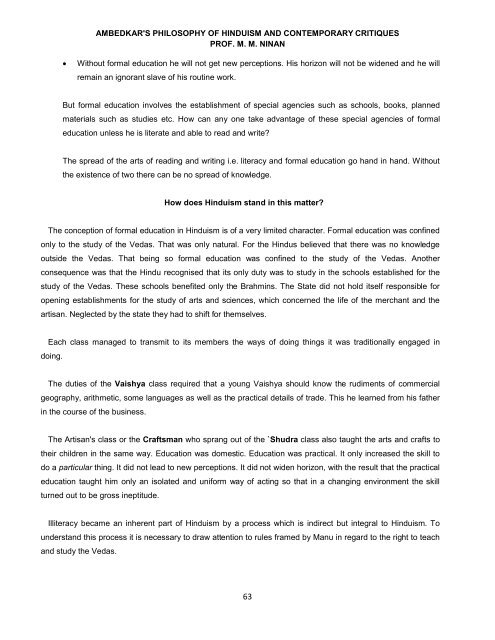Ambedkar-Philosophy of Hinduism
You also want an ePaper? Increase the reach of your titles
YUMPU automatically turns print PDFs into web optimized ePapers that Google loves.
AMBEDKAR'S PHILOSOPHY OF HINDUISM AND CONTEMPORARY CRITIQUES<br />
PROF. M. M. NINAN<br />
• Without formal education he will not get new perceptions. His horizon will not be widened and he will<br />
remain an ignorant slave <strong>of</strong> his routine work.<br />
But formal education involves the establishment <strong>of</strong> special agencies such as schools, books, planned<br />
materials such as studies etc. How can any one take advantage <strong>of</strong> these special agencies <strong>of</strong> formal<br />
education unless he is literate and able to read and write?<br />
The spread <strong>of</strong> the arts <strong>of</strong> reading and writing i.e. literacy and formal education go hand in hand. Without<br />
the existence <strong>of</strong> two there can be no spread <strong>of</strong> knowledge.<br />
How does <strong>Hinduism</strong> stand in this matter?<br />
The conception <strong>of</strong> formal education in <strong>Hinduism</strong> is <strong>of</strong> a very limited character. Formal education was confined<br />
only to the study <strong>of</strong> the Vedas. That was only natural. For the Hindus believed that there was no knowledge<br />
outside the Vedas. That being so formal education was confined to the study <strong>of</strong> the Vedas. Another<br />
consequence was that the Hindu recognised that its only duty was to study in the schools established for the<br />
study <strong>of</strong> the Vedas. These schools benefited only the Brahmins. The State did not hold itself responsible for<br />
opening establishments for the study <strong>of</strong> arts and sciences, which concerned the life <strong>of</strong> the merchant and the<br />
artisan. Neglected by the state they had to shift for themselves.<br />
Each class managed to transmit to its members the ways <strong>of</strong> doing things it was traditionally engaged in<br />
doing.<br />
The duties <strong>of</strong> the Vaishya class required that a young Vaishya should know the rudiments <strong>of</strong> commercial<br />
geography, arithmetic, some languages as well as the practical details <strong>of</strong> trade. This he learned from his father<br />
in the course <strong>of</strong> the business.<br />
The Artisan's class or the Craftsman who sprang out <strong>of</strong> the `Shudra class also taught the arts and crafts to<br />
their children in the same way. Education was domestic. Education was practical. It only increased the skill to<br />
do a particular thing. It did not lead to new perceptions. It did not widen horizon, with the result that the practical<br />
education taught him only an isolated and uniform way <strong>of</strong> acting so that in a changing environment the skill<br />
turned out to be gross ineptitude.<br />
Illiteracy became an inherent part <strong>of</strong> <strong>Hinduism</strong> by a process which is indirect but integral to <strong>Hinduism</strong>. To<br />
understand this process it is necessary to draw attention to rules framed by Manu in regard to the right to teach<br />
and study the Vedas.<br />
63


















